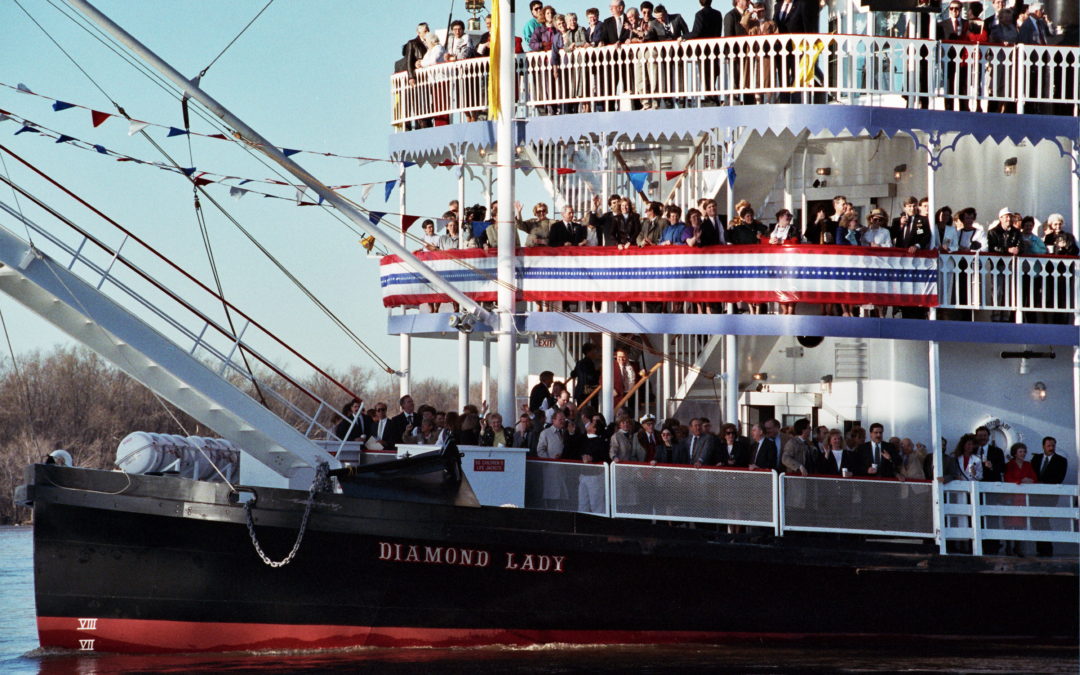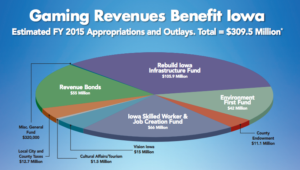
Hope In The Time Of Crisis: The Iowa Gaming Story
(Picture above, courtesy IGA and Isle of Capri: The first riverboat casinos in the United States took off in Iowa on April 1, 1991, with the Diamond Lady launching off the shores of the city of Bettendorf in Scott County)
Twenty-five years ago, in April 1991, the U.S.’s first riverboat casinos opened for business in a rather unexpected location: Scott and Dubuque Counties, Iowa. In the 25 years since, gaming taxes have generated more than $22 billion for the state.
According to the Iowa Gaming Association, Iowa’s casinos, which hosted more than 21 million visitors last year, were collectively responsible for more than $1 billion in annual economic impact to the state. In addition to employing about 10,000 people, with an annual payroll of almost $275 million, they also awarded $57.4 million to 1,158 not-for-profit bodies in the 15 Iowa counties that have casinos, and funded 2,130 charitable grants in counties that don’t have casinos, aggregating about $8.4 million in community improvements across Iowa in 2015.
All of this together, in a state of 3.1 million people, where the annual budget is about $6 billion, makes the casino industry a considerable force for change, and an equally potent force for good.
The gaming industry in Iowa is also unique in many ways, having its beginnings in cruising riverboat casinos — the first such in the country — established after the state economy was decimated by the American farming crisis of the 1980s.
At that time, according to reports, the United States agricultural debt (which forced farmers to declare bankruptcy) “had reached $216 billion in 1984, of which $17 billion was in Iowa alone.” The reports, quoting the U.S. Department of Agriculture, estimated that in 1985, net farm income declined by 30 percent and land values were reduced by 50 percent, forcing one of three commercial-sized farms to be unable to pay their bills. Reports of federal government research at the time estimated that “farmland value dropped by nearly 60% in some parts of the Midwest between 1981 and 1985.”
The Biometrica Blog Team spoke with Iowa Gaming Association President and CEO, Wes Ehrecke, to find out more about how Iowa’s people and legislators helped turn the state’s fortunes around with a rather unique solution, gambling, and how Iowa’s proactive approach to gaming has created a thriving industry.

BBT: How did it all begin for you, from banker to trade association evangelist?
W.E.: My background has actually been in association work for about 38 years. I started with the Iowa Bankers Association, representing all the banks in the state, and primarily doing their legislative work, including as a senior vice president. I then went to the Iowa Association of Electric Cooperatives, which represented rural utility cooperatives, and worked with them for a few years as their CEO, and then headed up to the Minnesota Bankers Association as their CEO, before starting up the Iowa Gaming Association, a trade group that currently represents the 19 commercial casinos in the state, from scratch.
What was your and the IGA’s role at the time this all began in 1999?
At that time, at the turn of the year 2000, we were focused on educating people around the referendum votes, part of the process of getting the authority for riverboat gaming to having legalized casino-style gaming in Iowa. The legislature wanted to have a vote every eight years in the counties that had casinos, to approve them continuing to have casinos. The opponents (of casinos) were trying to make the case that they should be voted out, so I helped organize each of those educational campaigns at the time, in each of those counties. We had these referendums passed in 2002, by an average of 73 percent.
And then eight years later, you had to have them vote again?
Yes, we had to vote again in 2010, and that time, we had them passed by an average of 78%. The yes vote in some of these counties was as high as 85-86%. It was remarkable, really, given that in any election, when 60% is considered a landslide, to have this kind of bipartisan support of civic leaders, business leaders, citizens, church leaders, and others.
Was it difficult, building this support?
It was challenging at first. We had to dispute a lot of the myths that the opponents of gaming were throwing out on crime and other issues. We brought the facts, went out and attempted a truth tour of sorts to all the media outlets, print and broadcast, and had to educate people to actually go out and vote, and turn this ballot over. A big step was when we worked with counties and legislators to have that need for a referendum every eight years removed, so that if a county had successfully passed their referendum two consecutive times, they would no longer be required to vote to get that done in the legislature. That was what our story of the early days was about, our work was focused on putting on a very proactive and positive face on the business of gaming in Iowa. And now it’s 25 years old.
You described some of the myths that were brought about by your opponents, including on crime. What kinds of myths were you fighting?
Generally speaking, opponents of gaming would repeatedly throw out what’s called the ABCs of so-called problems: Gaming Addiction, Bankruptcy and Crime. With addiction especially, there was a need to educate people that there was a lot of scientific research out there, which showed that some people would always be prone to compulsive behavior, and it wasn’t just about gaming. There’s compulsive eating, shopping, a compulsive use of credit cards, and in this case, compulsive gambling. However, as statistics and the continuing research of several years showed, even as the expanding number of casinos, the percentage of people experiencing compulsive gambling, stayed at around one percent.
Just one percent? That’s interesting …
Yes. Even with what’s called problem gambling, they talked of this being between one and two percent. So for those folks, we let it be known that we had programs in place. We have 800 Bets Off helpline, there are providers that we’re helping fund, to do gambling treatment counseling that would help these individuals get help if they so decide to, much like with any other compulsive behavior. The idea was that if someone needed help, we were able to be in a position to provide that assistance.
And that helped offset some of the criticism?
We were able to dispel negative beliefs, and point out that well over 98% of people could go to a casino for the fun and entertainment it provided, and not have a problem. They would be responsible, work with a budget, and spend their discretionary dollars earmarked for entertainment. Just as an aside, we’re competing for those entertainment dollars everyday, people do have choices in what they want to spend their dollars on.
What of bankruptcy?
It’s related, isn’t it, to that rare compulsive gambler? We proved our point through actual facts. We looked at 700 actual bankruptcy cases. People had to indicate, if they went through bankruptcy, if they were in this situation because of any gambling losses. Again, it was less than three percent that even marked them. We took those findings to the press too.

Crime isn’t a major problem for Iowa’s casinos, we would imagine, given that Iowa is way down the list of states that have high crime. On Law Street Media’s Crime in America 2015 listing, featuring the safest and most dangerous states to live in (based on the FBI’s violent crime data), Iowa was at No. 34, with 271 violent crimes per 100,000 people.
Yes, Iowa is pretty low down on the state crime rankings, and crime in Iowa casinos is pretty negligible. Even for bankruptcies, we were ranked forty something [Note: Iowa was ranked 37th from the top among states for bankruptcies per 1,000 people in 2014, with 1.58 per 1,000 people. Tennessee, at No. 1, had 6.22 bankruptcies per 1,000 people].
Any place you’re going to have large gatherings of people, whether it’s Disney World or anywhere else, you’d have issues. We put ourselves in that category, as we’re collectively Iowa’s largest tourist attraction, and with about 22 million visitors every year, there are bound to be incidents of some sort. But we don’t have a huge crime problem, or a violent crime problem at our casinos. With all the cameras etcetera, we get petty theft in the parking lots and things like that, but not major stuff. We had testimony to this effect from sheriffs and police departments.
What kind of testimony?
To the effect that crime in Iowa casinos is negligible. They wanted to support having very secure and safe places being premier entertainment destinations. And frankly, from our perspective, we needed them to be safe and secure places, places where people would want to go without fear or worry. We also do have our own security personnel, and police and law enforcement backup.
There are some researchers that say that for every dollar gained in revenue there are two to three dollars in problems, but we disputed that. If we’re a $1 billion in annual revenues industry, that would be a $3 billion problem. Our state’s budget is about $6 billion. So to put that in perspective, if we had a $3 billion problem, the legislature and everybody, including our citizens, would shut us down tomorrow. They voted for the casinos because they could see that none of those so-called facts were really true, and they voted by an average of 73%-78% in two different referendums in their counties to indicate that they totally supported what we were doing.
And you’ve contributed a lot to building up communities.
The charitable grants program in Iowa is rather unique in the country, awarding $65.8 million in grants last year. The casinos have a nonprofit entity, call it a license holder, which receives dollars from each casino, in each of the casino counties. To receive these dollars, these entities have their own board of directors that determine the kind of criteria of grants to provide. That’s been going on now for 25 years. Additionally, in the last 10 years, the legislature set it up that we provide all of the non-casino counties — 84 of Iowa’s 99 counties don’t have casinos — with between $11-12 million a year, or about $130,000 per year for each of these 84 counties, to also then receive funding for worthy causes. The bottom line though, is that every citizen in this state is benefiting in remarkable ways from these charitable grants.

It’s always been intriguing in a sense, when some people talk about gambling being sinful, because local churches in many places are funded by bingo nights, which is a very basic form of gambling.
It was one of the things we came up against, back during the early campaigns. Certain religious faiths held that gambling was wrong, so I met with lots of the religious leaders, parishioners, bishops of different faiths, and spoke with them about the benefits of charitable grants to their communities. And now they do apply for grants for things like a new roof for a church, or other community building projects. I’ve also pointed out that if you look back at how our country was formed, back in the time, back when our forefathers left England and came here, it was for the freedom of religion, freedom of speech.
Speaking of the early days of the U.S., lotteries in colonial America played a major part in funding both private and public ventures.
Yes, in infrastructure, education, churches. Some of the first armies were funded by lotteries, and I think an attempt was made to even fund Washington’s army by lottery. So we point these things out, people get it, but you have to dispel myths and inaccuracies by bringing forward the facts. Most realized how viable we are, adding value to the state’s tourism and entertainment industries, and being a valuable part of Iowa’s economy.
Iowa’s casino industry has a fascinating history. Could you give us a quick look at the beginning of it all?
Twenty-five years ago, actually 27 years ago, in 1989, Iowa, like other states in the Midwest, was coming off a major farm crisis. A couple of the counties, Dubuque and Davenport, right on the Mississippi River, bordered Illinois and Wisconsin, and were very closely tied to agricultural manufacturing. As a result, with the farm crisis, they had high unemployment. Some may recall the billboards at the time, which said “the last one out, turn out the lights.” Things were looking bleak for some of these communities. So legislators got together to try and find a workable, different solution. They were looking for something that would be a catalyst for economic development, something that would generate tourism dollars, something that would create good jobs.
And they came up with the idea of riverboat casinos?
They did. They created the idea of the riverboat, something that would bring people to the rivers, have casinos, have people cruise on the rivers, create tourism, create jobs. They passed legislation permitting this in 1989, and the first riverboat casinos, then the first in the country, were launched in April 1991. At the time, there were land-based casinos in Las Vegas, Atlantic City and I believe, in Deadwood, South Dakota. But we were the first in the country to have riverboat casinos, and that was the boom.
But they no longer cruise now?
As the thinking evolved over the last two-and-a-half decades, we were no longer required to cruise, and were allowed to have land-based casinos or riverboats that could be dockside. We now only have three riverboats, they don’t cruise anymore, they are dockside. We moved to being land-based, the kind of footprint that saw casinos grow to having hotels built around them, and many other amenities. But the point with that is that we started at our rivers, and developed from there, we were unique.
Where do the tourists come from?
We have five states that are contiguous, and other tourists come from within Iowa. If you’re 50 miles away, you’re considered a tourist, so we draw extensively from around the area. About 65% of our business, though, comes from out of state. We have some premier facilities that are no longer just riverboats. We have many amenities that we offer, hotels, we have meeting and corporate facilities, wedding facilities, space for concerts, bars, golf courses, comedy clubs, bowling alleys, fine dining restaurants, all tying in the complete entertainment experience.
How much of a say do you at the IGA, and other casinos, have in how the money is disbursed?
We, at the IGA, have none. How much say does each casino have? Pretty much none too. They provide the dollars to the nonprofit license holder entity. These entities have their own separate board of directors, they establish the criteria for the areas they want to fund, receive applications, go through the scoring and then they decide.
So they’re really helping communities decide for themselves and help themselves.
They’re also contributing to building up a community. In the communities they are in, people heading to a casino aren’t just spending there. They’re also spending in the communities around, on things like buying gas, going to restaurants, shopping. Coming on the back of the farm crisis, this has done amazing things for the state. Our casinos collectively employ about 9,500 people, a significant number of whom have been in the industry for over a decade, many have been there since the beginning, two and a half decades ago. They have put down roots and this stability has had a multiplier effect, as they’ve taken those wages and re-invested them back into the community.
You’ve also made a push for women and women leaders in the last few years.
Yes, in the last three years, we’ve tried to build up women leaders in gaming, and promote the industry as a viable career choice for women, not just on the casino floor in operations or as dealers, but also in lodging and hospitality, with restaurants, in concert and event management, finance, marketing, human resources. Some of our findings, in a poll of casino employment, were very encouraging.

Could you be more specific?
More than 50% of the approximately 9,500 industry employees at commercial Iowa casinos are female. At the supervisor level and above, 40% are female, while more than 30% of our senior executives are women. We have five women on the IGA board and several COOs and CFOs at casinos are female. No other industry is even close to where we’re at, in terms of women leaders, and women. We’ve been counting on this, as it’s a way to have more women consider a career in gaming.
Those are pretty incredible numbers, and not just in Iowa.
We’re trying to better them through our annual summits on women leaders in gaming, bringing in topics and issues and training specific to women, through mentoring, and networking and creating opportunities for women to climb the corporate ladder. The other thing that I’ve been so impressed about with this industry is that they tend to want to promote talent and advancement from within, and this is reflected in the longevity of employee careers and the stability in the industry.
What are some of the challenges ahead?
Dealing with the aftermath of the economic recession of a few years ago, much like any other industry. We are also close to saturation point in the number of casinos we can have in the counties they exist in, there is competition from surrounding states that wasn’t there previously, and a certain amount of belt-tightening for the discretionary dollars people have. We of course encourage people to spend it first on food, clothing, shelter, childcare, things like that are most important. There’s some flatlining in the revenue, we’re not going to see the kind of double-digit growth there was 10 years ago. Nonetheless, these casinos are still investing and we have to keep reinventing ourselves, as an industry, to give customers what they want.
What are you looking at?
Technology is certainly an integral part of it. The younger customers, the millennial and the Gen X-er, they are used to growing up on video games, so we have to look at using technology to create a new enhanced experience for them. It’s kind of what you’re doing with Biometrica, how you as a company are evolving from where you were. This isn’t unlike where you are going! We have competition for entertainment dollars. Customer service is always an evolving process. Unemployment in Iowa is pretty low in some places, 2-3%, which is great, but it means it isn’t always easy finding people to work sometimes. But it is part of the education process.
What lies ahead for you, personally? You’ve been part of helping build something special for your state, a lasting legacy for the future — an industry that supports jobs, philanthropy, communities … What do the next few years hold?
I hope I’ll still be helping keep the casino industry in Iowa thriving, making sure no one in the legislative and regulatory arena does us harm, and trying to create proactive change that will help us build a great base for gaming for the foreseeable future. This is an ever-changing industry, which makes it challenging, but also very exciting to go to work every day. No two days that are the same here, no two challenges are the same, and I enjoy it every day.